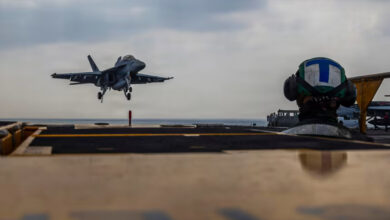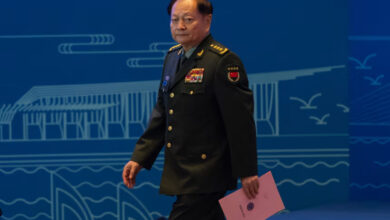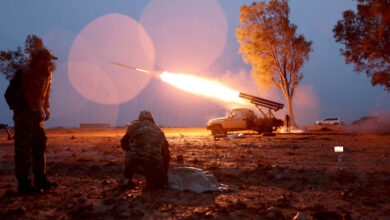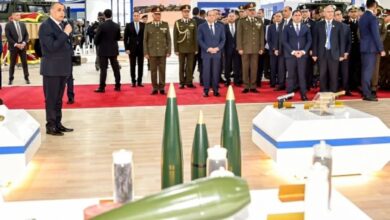The deadly struggle for power between Egypt's rulers and Muslim Brothers dates back to the rule of King Farouk, with each episode following virtually the identical script. Each time, for a brief period, ruler and Brothers "cohabit," but the marriage of convenience soon breaks down amid mutual recrimination. The ruler, recently arrived on the monarchial or presidential throne, reaches out to the Brothers to benefit from or at least neutralize the political support they command. For their part, the Brothers seek purchase within the state to ward off threats, obtain resources and gain footholds from which they may commence their final ascent to power. But this cooperation will not last, to judge by history — a history well-known to all players in today's unfolding story.
In the case of King Farouk, the Brothers overreached with a campaign of assassination, which provoked a counter-campaign that included the killing of the movement's founder-leader, Hassan al-Banna, and a general crackdown on the movement. In the case of Gamal Abdel Nasser, the new regime went so far as to provide the Brothers a cabinet seat before using an alleged assassination attempt on Nasser almost two years on to launch the campaign of terror against them that lasted virtually until the end of his life. For his part, Anwar Sadat reached out to the Brothers to fill the political vacuum resulting from his purge of leftist Nasserists only months after becoming president. For several years, they enjoyed his patronage and protection, before falling victim to his fear and megalomania.
Hosni Mubarak followed a similar script when he replaced the assassinated Sadat, reopening political space for the Brothers in the first years of his long rule, before settling on a formula in the 1990s that sharply constrained but did not eliminate their political presence. For years, Mubarak tolerated, and indeed benefited from, this limited presence. But like his predecessors, Mubarak ultimately tightened the screws on the Brotherhood further, seeking vainly in the final years of his presidency to destroy their economic and political base through an escalated campaign of arrests and repression.
The history of relations between modern Egyptian rulers and the Muslim Brotherhood has played out again and again in the same manner of the epic clash between the mongoose and cobra, with the former always winning. Field Marshal Hussein Tantawi and his fellow generals on the Supreme Council of the Armed Forces are of course well aware of this history. Their behavior suggests that they too want to benefit from the Brotherhood's political support during a transitional period. But almost as farce, history seems destined to repeat itself. The rivalry inherent in the relationship renders political cohabitation difficult to the point of being impossible, so the military mongoose can be expected to strike at the Brotherhood cobra yet again. But this time the outcome may be quite different.
The comparative evidence of relations in other authoritarian regimes between a ruling military and religiously based opposition parties is not as one-sided as the mongoose-cobra analogy implies. While General Franco and his military came to dominate all of Spain, including the Catholic Church and its right-wing political arm, Opus Dei, fascism elsewhere in Europe, including in Germany and Italy, saw the party, at least partially supported by the church, ascendant over the military. In Latin America, the military generally had the upper hand until democratic transitions subordinated it to institutional control. In Iran, however, the mullahs appear still to have the upper hand against both the regular military and the Revolutionary Guard Corps they created as a counterbalance to it. These battles do not inevitably result in the army subordinating the party.
Nor do the specifics of the current SCAF-Brotherhood political cohabitation suggest that history will necessarily repeat itself. The SCAF is playing a clumsy political game that may backfire. As a scheduled transition to civilian rule looms, the military is busily trying to draw redlines behind which its interests will remain inviolable. But that effort has undermined its political support and brought into question the very exercise. Over the long haul, the military will be hard-pressed to defend the lines it has drawn in the face of a contentious political arena and energized Egyptian public. Demands will intensify for scrutiny of its budget, its internal management, and for it to at least share responsibility for making national security policies.
One possibility is that a cabal of officers, perhaps of a pan-Arabist neo-Nasserist persuasion, could decide that the SCAF, the Brothers, the "revolutionaries," and indeed everyone else had made such a political mess of things since 11 February 2011, that they needed to intervene to save the nation. But in today's Egypt, they would be hard put to assert themselves over the newly empowered Brothers and fellow traveling Islamists. In none of the historic episodes did the Brothers seek to mobilize their supporters in the street against the state. But this time, after the events of the last year, no one could be guaranteed of such reticence now that they have finally arrived almost at the seat of power.
The underlying political economy of the military-Brotherhood cohabitation similarly seems to favor the latter. The current division of the political system gives the military and Brothers control over the "hard" and "soft" states, respectively. The former now encompasses all of the armed forces, including the security and intelligence services as well as the police, plus provincial governorships and heads of provincial, district and local executive councils. The potentially threatening position of chair of the parliamentary national security and defense committee was awarded by the Brothers to a former general, signaling their acquiescence to the military in this potentially key domain. The "hard" cabinet portfolios of defense, military production, interior, foreign policy, finance and international cooperation are presently all in the hands of SCAF loyalists, where they are likely to remain in the first independent government to be formed later this year. On paper, the military looks to be in an unassailable position.
But the Brotherhood's hold on the soft state and its political influence more broadly is far from trivial. The parliament, which it dominates, will have greater power than at any time since the first following nominal independence in 1923. While the Brotherhood is unlikely to institutionalize that power in an elected body, which it cannot be certain to control in the future, its leaders will be able to threaten to deploy parliament's latent powers to enhance their leverage. Assuming that they perform as well in local government elections as they have in parliamentary ones, the same will hold true in the governorates, districts, and municipalities. Councils at these levels will be able to contest for power with their executive branch equivalents. The Brothers' domination of professional syndicates and strong influence within the judiciary, as evidenced by their present role in the Judges Club and Supreme Council of the Judiciary, provide additional bases upon which they can build political power. While the constitution is yet to be written, it is widely assumed that it will establish a system in which considerable executive power is transferred to the legislative branch. The betting now is that the president will be a compromise candidate between the SCAF and the Brotherhood, thereby ensuring that this key figure cannot be a complete tool of either.
The Brothers are likely to attempt to begin to move against the armed forces simultaneously from the bottom and the top. The police on the beat, already deeply unpopular and demoralized, are going to find it very hard to push back against the Brothers, who have real power on the streets. Many police are likely to begin to find common cause with them. The same will be true, although in lesser degree, of military and security service conscripts, especially in the Central Security Forces of the Ministry of Interior. From the top down, the Brothers undoubtedly already have supporters within the various corps of officers, which they will seek to bolster. The potential for a bandwagon effect is certainly there, as careerists in the armed forces and those just serving their terms of conscription perceive that it is better for them to get with the coming strength rather than to be swept away in the ebb tide associated with the ousted regime and its officer legacy. So while the Brothers only dominate the soft state at present, it already provides a weighty counterbalance to the hard state, the control of which by the military will be challenged in the coming years.
The economic system is similarly, although not yet as sharply, divided into hard and soft components, but likely soon to be more so. The military economy includes consumer goods and services, but its principal concentration is in heavier industry. That tendency will probably be reinforced as the generals lay claim to assets seized from Gamal Mubarak's cronies, most notably those in iron and steel and other areas of energy intensive production. The Brothers' economic activities, such as those run by Deputy Supreme Guide Khairat al-Shater or businessman Safwan Sabit, are almost entirely in consumer goods and services, including retail shops, restaurants, food processing, household furniture and the like. They also have interests in formal and informal financial institutions.
As is the case with regard to politics, while at first glance controlling the hard economy seems to be an advantage for the military, over the longer haul controlling its soft components may give the Brothers the upper hand. Given the size and rate of growth of the population, consumer demand is bound to expand, thereby advantaging providers of consumer goods and services. And as important as economic advantage will be the direct contact between Brotherhood controlled companies and the public and the possibilities that provides for general reputational enhancement, resource accumulation, and recruitment. In addition, the Brotherhood will move to expand its existing social safety net and will draw upon state resources to do so, lest the appeal of the Salafis among the poor, as demonstrated in the parliamentary elections, become a serious political threat. This too will serve to reinforce its political standing and extend its reach.
Another economic consideration is the Brothers' ability to tap resources from the Gulf. While the Mubarak regime was kept on drip feed from Gulf sources and the SCAF has yet to obtain really major contributions from those sources, the Brothers' prospects are considerably brighter. Various of the Gulf Cooperation Council states have already demonstrated an interest in investing in the Brotherhood's political futures and as they brighten, more investors are likely to follow, whether through direct subventions, investments in businesses, or public assistance to the state. Finally, the expansion of the Islamic economy, as suggested already by the promised floating of a $2 billion sukuk (Islamic bond) issue, not only will provide another bridge to the Gulf, it will bolster the standing of the Brothers as competent and moral economic managers and as gatekeepers and stimulators of this flow of funds. By comparison, the military's hold over capital intensive factories producing military and intermediate goods will provide them few directly political advantages, either at home or in the region.
The comparative advantage of the Brotherhood over the military has already been displayed in the area of foreign policy. In a move of near desperation as it saw its support ebbing away, the SCAF launched an attack on the United States, using the issue of US funding to Egyptian NGOs to do so. This not only bit the hand that feeds the military, it stimulated anti-Americanism and anti-Westernism more generally, a tendency that is a threat to the military's interest and a boon to the Brothers'. Now that this whole subject has been opened, it can be manipulated almost at will by those who will benefit from chauvinism, which over the longer haul will assuredly be the Brothers, not the military.
The present cohabitation of the military and the Brotherhood, based as it is on the transient supremacy of the former, is therefore inherently unstable. A preemptive strike by the generals, or even by a colonel, as was done in the past, would be unlikely to succeed this time around. And failing such a strike, time is on the side of the Brothers. This time, they will be the victorious mongoose and the military the defeated cobra. Egypt is thus at a historic turning point as profound as when the republican era replaced the colonial one. Will they try to directly control the cobra they have defeated, or will they seek instead to subject that military to institutional control within an at least quasi-democratic polity? In other words, will they opt for an Iranian-style system of control of the armed forces, thereby converting them into a base for their own power, or will they choose instead to depoliticize the military, thus making democracy possible? Here, finally, neither history, nor the mongoose metaphor, offers us lessons.
Robert Springborg is a professor in the Department of National Security Affairs at the Naval Postgraduate School. The views expressed are those of the author and do not necessarily represent those of the Department of Defense or the US Government.
This article was first published in Foreign Policy.




